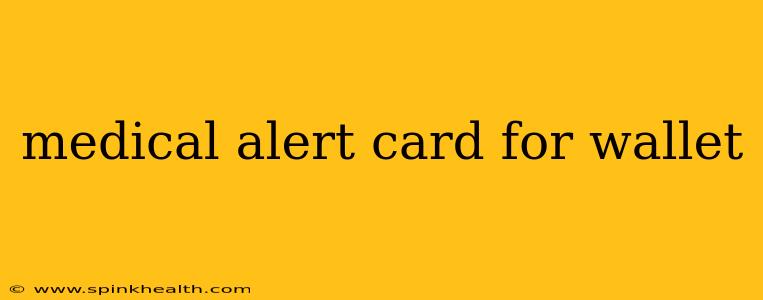Life's unpredictable. One minute you're enjoying a sunny afternoon, the next you're facing a medical emergency. Having a medical alert card in your wallet could be the difference between swift, effective treatment and precious time lost. This isn't just about convenience; it's about ensuring your safety and well-being. Let's delve into why a medical alert wallet card is crucial and how to create one that's truly effective.
Imagine this: you're involved in an accident and are unconscious. First responders arrive, but without vital information about your medical history, allergies, or emergency contacts, they're working blind. This is where your medical alert card becomes invaluable. It provides crucial information at a glance, allowing first responders to act quickly and decisively.
Why Carry a Medical Alert Card?
The simple truth is: emergencies happen. And when they do, seconds count. A medical alert card in your wallet acts as your personal health advocate, providing essential information to those who need it most during a critical moment. This is especially important for individuals with:
- Chronic conditions: Diabetes, heart conditions, epilepsy – a card clearly outlining these conditions can be life-saving.
- Allergies: Severe allergies to medication, food, or environmental factors require immediate attention.
- Specific medical needs: Details on implanted devices, ongoing treatments, or specific medication requirements are vital.
What Information Should Be Included on Your Medical Alert Card?
This isn't just about slapping your name and blood type on a piece of paper. A truly effective medical alert card needs specific, concise information. Here's what to include:
- Full Name: Clearly printed, ensuring easy readability.
- Date of Birth: A crucial piece of identification.
- Emergency Contact Information: At least two contacts with phone numbers.
- Allergies: List all known allergies, including medications. Specify the reaction if known (e.g., anaphylaxis).
- Medical Conditions: List any chronic conditions or significant medical history. Be as precise as possible.
- Medications: Include current medications and dosages. Consider adding a list of medications you're allergic to.
- Blood Type (if known): This can be invaluable in emergencies involving blood loss.
- Physician's Name and Contact Information: For follow-up care.
- Insurance Information: Your insurance provider and policy number can streamline treatment. (Optional - consider privacy implications)
What About Digital Medical Records?
While digital medical records and smartphone apps are increasingly common, a physical card offers irreplaceable advantages. Emergency responders may not have access to your phone or digital information in a crisis. A physical card remains easily accessible and visible, even if your phone is lost or damaged.
How to Create Your Medical Alert Card
You can design a custom medical alert card using a word processor or spreadsheet program, then print it on durable card stock. Consider laminating it for added protection. Many websites also offer downloadable templates.
Remember to regularly review and update your medical alert card. Any changes in your health, medications, or contact information necessitate an update to maintain accuracy.
Can I download a medical alert template?
While many websites offer downloadable templates, creating your own allows for maximum personalization and ensures you include all relevant information.
What if I travel internationally?
When traveling abroad, it's advisable to carry a medical alert card translated into the local language(s). This ensures that healthcare professionals understand your critical information, regardless of language barriers.
Is a medical alert bracelet a better option?
While a medical alert bracelet provides continuous visibility, a wallet card offers a supplemental layer of protection. Both can be highly beneficial, especially for individuals with multiple health concerns.
Your medical alert card is a small investment with potentially enormous consequences. Don't wait for an emergency; take proactive steps today to safeguard your health and well-being. This small card could quite literally be a lifeline.

